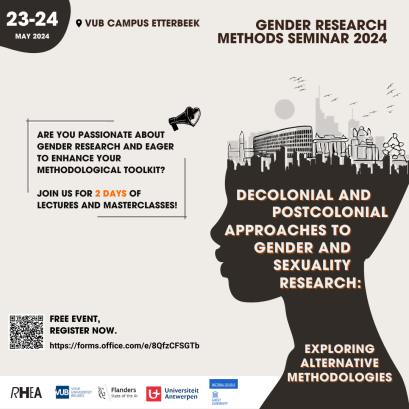Are you passionate about gender research and eager to enhance your methodological toolkit?
We invite you to participate in the upcoming Gender Research Methods Seminar 2024, taking place on May 23-24. In a world still grappling with the enduring legacies of colonialism and imperialism, this seminar prioritizes the exploration of decolonial and postcolonial theories and methodologies as vital tools for radically reimagining the study of gender and sexuality. The course will comprise of a two-day programme of lectures and parallel master classes.
The seminar is free, however registration is required!
Programme
23/05
| 9h - 9h30 | Welcome coffee + registration (I-building) |
| 9h30 - 11h | Keynote Lecture 1: Young people, sexualities and gender justice (I.0.03) |
| 11h - 11h30 | Coffee break |
| 11h30 - 13h | Keynote Lecture 2: Critically studying boys, men and masculinities: Key issues in national, transnational and global contexts (I.0.03) |
| 13h - 14h | Lunch break |
| 14h - 16h30 | Masterclass 1 (I.1.02) & 2 (D.1.08) |
24/05
| 9h - 9h30 | Welcome coffee + registration (I-building) |
| 9h30 - 11h | Keynote Lecture 3: Introduction to alternative decolonial feminist frameworks for scholarship on gender and sexual justice in local and global contexts (I.0.01) |
| 11h - 11h30 | Coffee break |
| 11h30 - 13h | Keynote Lecture 4: Feminist, decolonial pedagogies and research within the project of decolonising sexuality and gender research (I.0.01) |
| 13h - 14h | Lunch break |
| 14h - 16h30 | Masterclass 3 (I.1.02) |

Map
50.822999965942, 4.397442746631
Keynote Lectures
Keynote 1: Young people, sexualities and gender justice
Sisa Ngabaza is an Associate Professor and feminist scholar at the University of the Western Cape, South Africa, within the Department of Women's and Gender Studies. In Young people, sexualities and gender justice she will critically reflect on research and practice directed at young people’s sexuality on a global level, but also draw on insights from South Africa. This session explores the intersection of policy and practise to examine how young pregnant and parenting people, and young sexualities in general are shamed, silenced and regulated, with young women who dare to transgress normative prescriptions constructed as deviant and irresponsible. Ngabaza speaks to the urgent need to imagine alternative possibilities through decolonial feminist strategies in approaching young sexualities, especially in educational contexts, to promote gender and social justice.
The discussant for this lecture is Dr. Hannelore Van Bavel (VUB)
Keynote 3: Introduction to alternative decolonial feminist frameworks for scholarship on gender and sexual justice in local and global contexts
Tamara Shefer is a Senior Professor of Women’s and Gender Studies in the Faculty of Arts and Humanities at the University of the Western Cape, Cape Town. She will outline current directions in gender and sexuality justice efforts in higher education within the larger framework of decolonial, indigenous feminist, and queer challenges to eurowestern colonial logics. This will include an overview of contributions of feminist new materialist, posthumanist and postqualitative thinking towards opening up alternative imaginaries for research and pedagogical practice. A key component of the session will be a case study of hydrofeminist work in global and local contexts, that is feminist decolonial thinking with ocean and bodies of water, as illustration of post-qualitative methodologies and the (re)turn to environmental and planetary challenges within feminist decolonial goals.
The discussant for this talk is Dr. Amal Miri (UAntwerpen)
Keynote 2: Critically studying boys, men and masculinities: Key issues in national, transnational and global contexts
In this session Professor Jeff Hearn will introduce recent approaches to critical studies on men, boys and masculinities and how they connect with activist and policy approaches by and towards men and boys. At this historical time, there seem to be profound, contradictory tendencies and forces at national, transnational and global levels, upon men, boys and masculinities: on one hand, entrenchment and intensification of patriarchal, anti-feminist politics and practices, as, for example, in far right politics and misogynist organizing online. On the other hand, there are more signs of transformative possibilities, as, for example, in dissatisfaction with narrow work orientations, greater concerns for care, and acknowledgements of vulnerabilities. The contradictions of patriarchal relations are becoming clearer and even more urgent – in science, art, personal everyday life, politics, and globally.
The discussant for this lecture is Dr. Anneke Newman (UGent)
Keynote 4: Feminist decolonial pedagogies and research within the project of decolonising sexuality and gender research
Carmine Rustin is a feminist scholar and holds a PhD in Women’s and Gender Studies from the University of the Western Cape (UWC). She will share a number of practice-based feminist decolonial projects that engage experimental, creative methodologies in the context of decolonial feminist South African work. The first case study is the New Imaginaries for Gender and Sexual Justice, a 5-year project, showcasing how we have engaged with art and activism in the academy to challenge normative forms of pedagogy and research related to gender and sexuality scholarship. She will outline how we have foregrounded performance, art, music and literature through collaborations with artists, activists and scholars, and developed a body of critical research and pedagogical praxis, offering insights into how our scholarship can be done differently. Further, this session will share our work with feminist photovoice methodology, which recognises the knowledge and expertise that participants bring to a particular project through visual texts, whilst acting as agents of change in their particular communities (Wang & Burris, 1997).
The discussant for this Dr. An Van Raemdonck (UGent)
